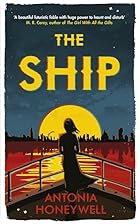
Lalage Paul, known as Lalla, 16,
lives in (a very changed) London but has
been sheltered from the chaos of a dystopian post-collapse world by her
parents. Her mother, who tries to give her an education via the British Museum,
despite it being colonised by a ragtag group of survivors; and her father,
Michael, part of the establishment, architect of the Dove, a program to “save”
Britain. Now the Nazareth Act has been put in place everyone must produce an
identity card, or they will be shot. Michael has a plan to escape, he has
bought a large ocean going ship and stocked it with food that is rapidly
becoming scarce in London. He has invited a group of people who all, in one way
or another, represent hope in the future. 500 people. When the chaos on the
streets of London becomes too much and a shocking event causes them to escape
immediately Lalla is full of hope. But where is the ship going? What is Paul’s
plan for escape? Why is the escapees devotion to him disturbingly cult-like?
This is a rollercoaster of a book
that wraps itself around you at the beginning and doesn’t let go. Lalla is
often annoying and spoiled, but utterly
believable and, as narrator the tension between naïveté, teenage angst and
slowly dawning comprehension is a difficult trick to pull off but Honeywell
does it with aplomb. Lalla is an insufferable spoiled brat, immature and irritating and yet you can’t help but be on her side,
which throws into sharp relief the question at the heart of the book (imho)
what is freedom? There are labyrinths here to explore and like all good books a
wealth to ponder and discuss, this would make a good book club read.
As those who follow my reviews
will know, I am not a fan of YA, and this is possibly going to be marketed as
such, teenage protagonist = YA right? However I think there is enough here to
satisfy any reader, it didn’t suffer from all the things I dislike about YA
fiction. It is also a dystopia and the problems that sometimes occur with that
genre, either over-explaining the world, or trying to justify unbelievable
worlds just doesn’t occur here. It is over the top, Regent’s Park is bombed to
remove undesirable non-ID’d people for example, but a light touch from
Honeywell makes you accept and move on. The world of the book is seen through a
glass darkly, but that enhances rather than detracts. Post-collapse books
usually take a “people are mostly bad” or “people are mostly good” stance but
Honeywell eschews this in favour of “people react in different ways” which is
refreshingly shades of grey.
The plot relies on Lalla being a
bit dense, which is a big no no for me usually, and yet, here, it works.
Honeywell’s accomplishment is to be applauded, taking several elements that
all, at face value, will turn off readers and making of them a compelling tale
that you don’t want to put down.
Overall - In short, this is a
book you ought to read.
No comments:
Post a Comment